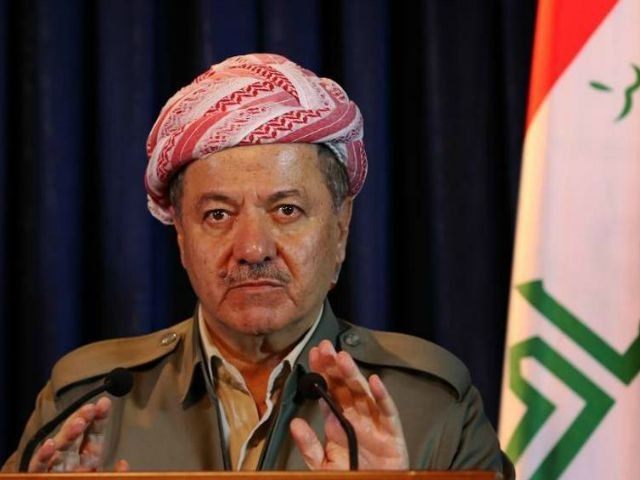Iraqi Kurdish President Masoud Barzani announced this weekend that he would not seek an extension of his term after November, stepping down amid an invasion of his territory by the Iraqi army and the Iran-backed militias known as the Popular Mobilization Forces (PMF).
Barzani, who has been in office for more than a decade, executed a non-binding referendum asking the citizens of the Kurdistan Regional Government (KRG) if they would support secession from Iraq, triggering Baghdad’s invasion of the disputed area of Kirkuk. The Kurdish military, the Peshmerga, has found itself isolated as the United States vocally opposed the referendum, and the State Department repeatedly declined to confirm reports that Iran-backed militias were launching attacks on the Peshmerga using American equipment.
In a televised speech on Sunday, Barzani addressed the absence of leadership from the Trump administration in supporting one of the most successful U.S. allies on the ground against the Islamic State, expressing shock at Washington’s relative silence over the attacks.
Kurds “have no friends but themselves and the mountains,” he said, referencing the struggle of the Peshmerga, both against the Islamic State (ISIS) and the Popular Mobilization Units (PMU/PMF), a coalition of mostly-Shiite guerrillas that enjoy support from Tehran and the United States. “Without the help of Peshmerga, Iraqi forces could not have liberated Mosul from ISIS alone.”
“Why would Washington want to punish Kurdistan?” Barzani asked.
“We didn’t expect people on US terror list to drive Abrams tanks, attack Kurdistan while Washington watched in silence,” Barzani went on to lament. Peshmerga officials have repeatedly stated that they have seen the PMU use American equipment against them on the battlefield and urged American officials to intervene. The United States armed the PMU in anticipation of the fight against the Islamic State in Mosul. While reports of the use of these weapons against Kurdish U.S. allies is new, accusations against the PMU of committing atrocities with American weapons surfaced in an Amnesty International report as early as January.
In his televised address, Barzani asserted the importance of the September 25 independence referendum and rejected the idea that the Iraqi military needed to attack Kurdish territory in response to the vote. “The 3 million votes in favor of independence cannot be erased, but we have faced obstacles,” he said.
“Baghdad used the referendum as an excuse [to attack Kurdistan], otherwise signs of their bad intentions had came to light long time ago,” he added.
To the Iraqi government, he said, “We don’t want bloodshed. We want the problems to be resolved through dialogue. But if you intend to wage war, we will choose death and won’t allow our honor to be broken.”
Barzani’s term officially ends on November 1. After that, he said, he will remain a member of the Peshmerga forces and a member of the Kurdish high political council. Barzani, 71, was expected to soon step down, though the invasion of Kirkuk has clearly expedited that decision. It is unclear who will succeed him, though his nephew, Prime Minister Nechirvan Barzani, appears an early frontrunner given his already prominent position.
The U.S. State Department issued a statement on Monday praising Barzani, “a historic figure and courageous leader of his people,” for stepping down and bizarrely also praising Iraqi Prime Minister Haider al-Abadi for his “strong leadership” after ordering the use of military force against Barzani.
Following Barzani’s address, thousands reportedly took to the streets of Erbil, the KRG capital, to praise Barzani and object to the collapse of his administration following the referendum. More than 90 percent of those who voted in September said “yes” to seceding from Iraq. The Kurdish outlet Bas News reports that Kurds rallied outside the capital, as well, in areas like Soran, Duhok, and Zakho.
The Associated Press reported that the most heated rallying occurred in Erbil, where “an Associated Press team witnessed dozens of protesters attacking the building, parliamentarians and journalists as Barzani addressed the Kurdish region in his first televised speech since the referendum’s fallout turned violent earlier this month.”
In Zakho, Kurdish outlet Rudaw reports that a mob burned down the offices of the opposition Patriotic Union of Kurdistan (PUK) party, which Barzani blamed for the “betrayal” that allowed Baghdad to reclaim Kirkuk.
Meanwhile, PMU attacks continue in some Kurdish border areas, while Baghdad – which claims to control the PMU – “reached an agreement” with the KRG on Monday to temporarily pause fighting in some disputed areas.
Kurdish groups on the ground, including the PUK, have warned that the PMU has undertaken ethnic cleansing activities against the Kurds in the areas they now control.

COMMENTS
Please let us know if you're having issues with commenting.